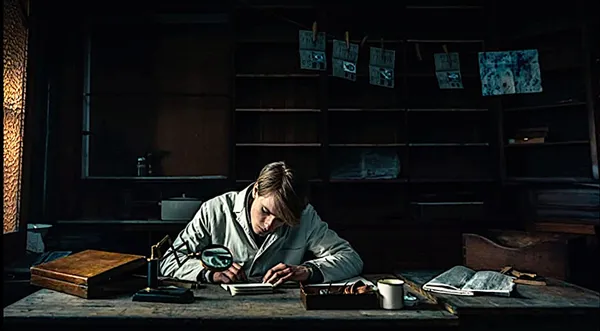 |
| Louis Hofmann as Cioma Schönhaus in Maggie Peren’s daring and intriguing The Forger (Der Passfälscher) |
Maggie Peren’s The Forger (Der Passfälscher), shot by Christian Stangassinger, which was a Berlinale Special World Premiere at the 72nd Berlin Film Festival, and was adapted from Cioma Schönhaus’s truly extraordinary memoir, tells the story of a young Jewish man named Cioma (Louis Hofmann) in 1942/43 Berlin. With a graphic design education, he was drafted to work as a skilled laborer in a munitions factory. Thus deemed essential for the war effort, he was spared from being “sent East” together with his entire family.
 |
| Maggie Peren with Anne-Katrin Titze on Cioma Schönhaus and the Sterntaler Märchen in The Forger: “Cioma loved German music and he loved German fairy tales, so it is my tribute to him.” |
It is the unusually light, almost cheery tone and the protagonist’s trickster charm that sets this film apart. Cioma’s circles are larger than “officially allowed” which turns out to be crucial for survival. He uses his drawing skills to help forge ID cards for a resistance ring headed by Franz Kaufmann (Marc Limpach), a former government minister, whose clever motto is that “good forgeries are little works of art.” And they can save lives. Cioma also likes to enjoy the Berlin nightlife with his friend Det (Jonathan Berlin), whose parents met the same fate and whose situation is even more dire than his pal’s.
Disguised as a marine officer on leave, Cioma meets different women and dazzles them with his smooth talk. Among them is Gerda (Luna Wedler, seen in Margarethe von Trotta’s Ingeborg Bachmann - Journey Into The Desert, starring Vicky Krieps and Ronald Zehrfeld at the 73rd Berlin Film Festival) who turns out to be incognito as well. When an inspector named Dietrich (André Jung) seals off large parts of the Schönhaus family apartment for repossession, another challenge is met with ingenuity, daring, and a widowed landlady, Frau Peters (Nina Gummich), who never says no when profit can be made.
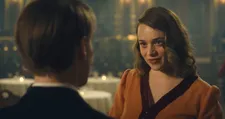 |
| Gerda (Luna Wedler) with Cioma (Louis Hofmann) |
Then there is Cioma’s carelessness. He tends to lose his wallet, including his forged papers, and needs three alarm clocks to wake up in the morning and still be late. But he knows one thing, namely that the audacity and ruthlessness and shamelessness of the regime is what can be used against it as well. The classic fairy tale collected by the Brothers Grimm, called Sterntaler (The Star Coins), receives a chillingly evocative reinterpretation at a point in time when the meanings of sacrifice reward seem to be completely up in the air. The question is, how much knowledge of the historical background, the facts about the deportations mentioned as asides, do audiences need to know to comprehend the severity of time, place and circumstance?
From Munich, Maggie Peren joined me on Zoom for an in-depth conversation on The Forger.
Anne-Katrin Titze: Hello Maggie, nice meeting you!
Maggie Peren: Hi Anne-Katrin, nice meeting you!
AKT: You begin your film at the Lost and Found, the Fundbüro. It is the only moment we return to later on and I found it very appropriate to the story. Because in a way the story of Cioma Schönhaus is one that was lost for a long time, in the sense that people didn’t know about it, but can find again here.
MP: Cioma himself didn’t tell anyone that he was Jewish for decades, which I can understand better and better now. When I met him in 2015 I couldn’t understand but now in 2023 I can understand it a lot better. He didn’t say that he was Jewish, so he couldn’t tell the story of being a young Jewish man in Berlin who even worked for the resistance. So the story was actually lost in Cioma. When he came out, he desperately wanted it to be filmed for the big screen.
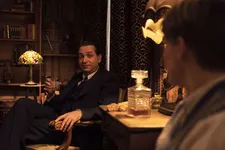 |
| Franz Kaufmann (Marc Limpach) with Cioma (Louis Hofmann) |
For me as a filmmaker it was very surprising that we in Germany have certain narratives that we tell over and over and one of them is of a good German saving a Jewish person. And Franz Kaufmann and [Ludwig] Lichtwitz [played by Yotam Ishay], and Cioma Schönhaus more or less saved themselves. That is very unusual. When I was doing press for the film I was always asked: “So have there been Germans helping them?” And I said, yes, there was a circle of people. I think we as a nation didn’t look for the possibility that there were Jewish people helping other Jewish people. We lost this a little bit as well. So thank you for the question. I think it’s a beautiful question.
AKT: You said you met him 2015, this means he was around 92 years old?
MP: I was 41, we are 51 years apart. So, I met him in 2014.
AKT: His story is so unusual and I think Cioma’s outlook is what distinguishes your film. It’s so light and he is so cheerful. Did you see some of the cheerfulness in the 90-plus-year-old man?
MP: Yes, a lot. He was smiling. He worked in advertising all his life. He started with drawing. He knew how to wrap people around his fingers. That was his biggest weapon. He was very charming and smart. He was actually a lot cheekier than he is in my movie. He bought a sailboat in the middle of 1942, actually as a hiding place. He invented hiding in the midst of people.
AKT: In plain sight!
MP: Yes. There was an American article that called him the “most visible invisible” when his book came out.
AKT: He used the tactics of the regime. The audacity and ruthlessness of the lies he understood and used some of the tricks himself.
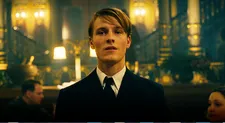 |
| Cioma (Louis Hofmann) hiding in the midst of people |
MP: Yes, that’s what he did. Cioma was a very non-violent person. For him it was hard to see that we have the tendency to show the Germans as not anti-Semitic. For Cioma it was this huge amount of anti-Semitism that is actually coming back in Germany at the moment. For him it was one of the greatest concerns.
He wanted me to not outsource it but really show it. Like the neighbor, Frau Peters. She forced his best friend to make love with her, for example. He wanted this to be in the film but he also wanted people to take part in his cheerfulness. So I asked “Do you think this works in Germany that I tell a character who loves life so much and not show the Nazis all the time?” He said “It has to! It’s your message!” He’s a very cheerful person but also a very intelligent and deep person. When he was older he went to schools and talked mainly about anti-Semitism.
AKT: A striking moment contains the fairy tale collected by the Brothers Grimm called Sterntaler, Star Coins. It was one of my favourite tales as a child. The way it is presented as a retelling in this cartoon really made me think. The tale itself is all about sacrifice and helping and over sacrifice. Please tell me about this sequence!
MP: It came to my mind after Cioma died. It was a big loss. It had been easy writing and then going to the telephone to ask him questions. Cioma loved German music and he loved German fairy tales, so it is my tribute to him. I’m so happy you like this so much because it’s really my tribute as a filmmaker for him as a human being. He felt really German, a Berlin boy, Berliner Junge. Leaving town and never going back was such a great loss for him. This whole Sterntaler Märchen with someone who gives everything and then someone who is so stigmatised, who has the big “Jew” on the star, this is, I think, how Cioma felt about being a Jewish German in 1942.
 |
| Cioma (Louis Hofmann) going to work |
AKT: He lived in Switzerland his whole life after fleeing? In Basel?
MP: Yes, he lived and died in Switzerland. He actually adopted the Swiss dialect, speaking in Swiss German. When I had him on the phone he was falling back into German German. When he started to speak German German he often started to cry because all the stuff came out.
AKT: Of course, it’s all in the details. Memories can be locked in one word. It is the unexpected markers that get to us, it’s never the big picture and always the kernel of our truth.
MP: Yes, psychologists call it Einfalltore (gateways). A way to get to traumatised people and they open up. Sometimes when Cioma was singing a song he liked from the 1940s, that’s when he really started crying so so hard. In his eighties when he started to tell his story, maybe he put in all this lightness to cover the sadness inside of him.
AKT: I also want to talk to you about your use of historical markers in the film. When the two friends are talking in the apartment about their families having been sent “to the East” it sticks in your throat when you know what is implied. The casualness with which they say it makes the effect even stronger.
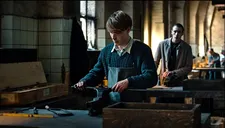 |
| Cioma (Louis Hofmann) at work |
MP: Thank you so much! Thank you! Because I spoke so much with Cioma about it and he said what hurts him a little bit is that we with our knowledge about this time put our knowledge above everything. I watched with him World War II movies and he said “Maggie, my mother she bought her furniture when she got married in the 1920s so in her room I want to see furniture from the 1920s.”
For him it was really important to tell the story out of the mindset that he was in when he was 21 and not our knowledge. The scene was in 1942 and I think in late 1943 the rumors were getting bigger and people started to know what happened in the East, but not then. Thank you for seeing this, because it was so important to him. Some of the audience didn’t understand that they say it in such a casual way, but it was June 1942 and they really didn’t know.
AKT: That is the frightening thing. In the end credits you give us the number of the transports that his parents and later his friend were on.
MP: Det was really on one of the very last ones. Do you know in America about our Stolpersteine?
AKT: Yes, the stones in memory of the victims.
MP: Yes. And Cioma has a Stolperstein now, because Louis Hofmann who plays Cioma called them. His parents had them and now Cioma has one as well.
AKT: He didn’t have one before?
MP: No, but Louis Hofmann got him a Stolperstein. For me as a filmmaker it’s heartbreaking walking through Berlin and seeing on this street is Ludwig Lichtwitz and on that street are Cioma and his parents.
 |
| An illustrated Star Coins in The Forger |
AKT: There was a documentary short called Colette [directed by Anthony Giacchino], that won the Oscar two years ago about a French resistance fighter whose brother died in the Dora-Mittelbau concentration camp in Thuringia. It included a Stolperstein moment.
MP: I’ll look for it. It’s very touching. I’m so lucky I could meet Cioma. His face was lighting up when he was talking about Berlin. It was his town.
AKT: You show it in the scenes when he is going out at night, pretending to be a marine on leave. This is where Gerda comes into play. The actress Luna Wedler is terrific. I saw that she is in Margarethe von Trotta’s new Ingeborg Bachmann film that just premiered in Berlin.
MP: Yes, just a couple of days ago at the Berlin Film Festival. Because of the pandemic we had almost a year to prepare the film. And Luna like Louis - they are Jewish but have not been raised very religious. Which was actually quite common in the 1940s in Berlin. It was such a huge modern town. Then the Nazis came in and they got labelled as being Jewish.
It was difficult for Luna to understand how this stigmatism worked on Gerda. And Cioma told me that Gerda like himself were traumatised when they got this passport with a big “Jew” in it. I think Luna got it in the system of being really terrified of something you didn’t really think about before. Does this make sense?
 |
| Cioma (Louis Hofmann) with Det (Jonathan Berlin) |
AKT: It makes perfect sense. The phrasing is she has to “date to survive.” It shows the toll on women. You can find traces in Billy Wilder, in some of Marlene Dietrich’s performances, in Fassbinder. Gerda here treads a fine line; she has to perform and come across as truthful.
MP: I mean her life was so much harder than Cioma’s life. I don’t want to underestimate what Cioma was going through, but for Gerda there was no support. He had this ring of supporters and Gerda had no support at all.
AKT: What makes his character depiction so unusual is also his carelessness. That he needs three alarm clocks and more than once loses his wallet with forged papers. It goes hand in hand with the mimicry and being an impostor. Gerda must have wanted to grab him at times and shake him. The question of chance and so many things fall together.
MP: Cioma is a very childlike character and stayed like this, even when he was old. I think he was even worse. The real Cioma on the big screen would have been unbelievable. In our world where we have cameras and smartphones everywhere, we can’t even imagine that you can really hide in a big city like Berlin. A friend of his crossed out his own name at the door and pretended that he is a different person living in the same apartment now. That would not be possible anymore today.
AKT: To pretend this way, no.
MP: And that was really important for Cioma. He always said; “I want to be Cioma in your film, and not a Cioma.”
AKT: Yes, an individual human being and not a caricature of the hiding Jewish man in Berlin.
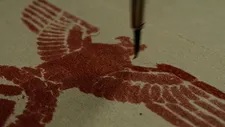 |
| A forged official stamp by Cioma (Louis Hofmann) |
MP: Yes, and I understood what he meant.
AKT: What about Franz Kaufmann? He was an official working in the ministry, but he had a Jewish mother and couldn’t continue his career?
MP: He was in the First World War and like many Jews who were in the war had a strong belief that none of this could happen to him. First he was in denial and then in furious anger. Then he was in the Bekennende Kirche (Confessing Church), which is the only little bit of church we had in all of Germany who went into the resistance.
It was Protestant but there he found people who picked him up emotionally. He was traumatised, his best friends turned against him, he didn’t even receive a pension and was kicked out of everything. He was a lawyer, and couldn’t work anymore. He found peace and a purpose in life in the Confessing Church.
AKT: And he started this ring of forgers?
MP: Yes. In the beginning he hated him. Franz Kaufmann is everything Cioma is not and the other way around. Cioma was very life affirming and Kaufmann was so angry and his marriage was unhappy and he was unhappy, feeling lost and abandoned. And here comes this young man who seems without a care. For me this was really wonderful - to have these characters who have the same purpose but a very different approach.
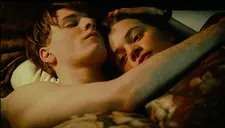 |
| Cioma (Louis Hofmann) with a worried Gerda (Luna Wedler) |
AKT: I want to ask you about audiences for your film. You can watch with a lot of knowledge about the time and circumstances but I get the sense that you also want to reach young people who might not have that much of a historical background. How much background do you need to understand? Do you need any? I don’t know if I’m making sense with this question.
MP: You make complete sense and it’s actually a very smart question because young people really like the film. So many school classes liked it so much because they could completely identify with the Jewish character. In order to understand what we Germans did you have to identify with someone. I told them for example that they were not allowed to keep pets. We talked about what was forbidden, no radio, no telephone, and then they came to take your cat.
And all the girls and boys went “Oh no, they took their cats!” It’s crazy, you know there were millions and millions and millions of people killed but for young people this number is so outrageous they sometimes can’t connect. And Cioma because he had some of the same issues, falling in love with a woman, and wanting to enjoy life, they could really connect with him and then they could connect with the way of repression. Older people, I had an audience here, most of them were 70 to 80, they were so angry that there were not more angry Nazis in my film.
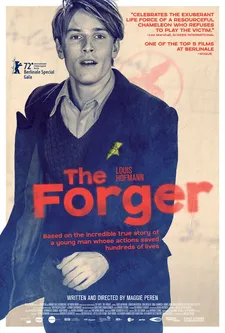 |
| The Forger opens at the Quad Cinema in New York on March 3 |
AKT: Angry Nazis?
MP: Yes, they said “it was a horrible time and he walks around like nothing.” And I told them that for me it was important to show that anti-Semitism was in the midst, in the neighbor, in the police officer who comes in sealing the doors. Some of them were really angry at me that I didn’t show the Nazi with the big uniform that you can pin all the blame on. Kind of feels like I made a film for the next, the younger generation a little bit.
AKT: I think it would be worse if it were the other way around.
MP: It’s maybe for people who have this joyfulness inside of them and understand that this joyfulness saved his life more or less.
AKT: Thank you so much for this!
MP: It was really lovely, thank you!
The Forger opens at the Quad Cinema in New York on Friday, March 3.





















